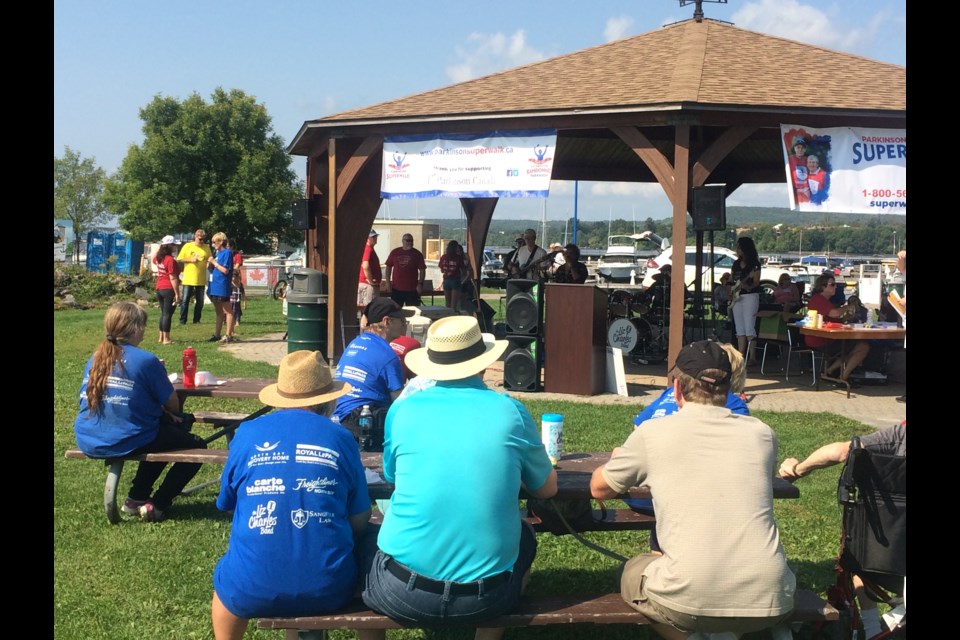Every September, Canadians across the country turn their focus on raising research dollars for Parkinson’s disease.
In North Bay, the Parkinson Canada SuperWalk fundraiser began four years ago, when Shaun Billingsley decided to organize the event in honour of his father, who was diagnosed with the disease when he was in his early to mid-sixties. He’s now 80 years old.
“The first year we weren’t really focused so much on the fundraising as we were just getting the word out that there was even a Parkinson’s group in North Bay, because very few people come out in public as much as other diseases that are out there because of the tremors,” said Billingsley, who saw his father go through many changes.
“The main thing is the mobility and being able to do the day to day things. With my father, he’s done everything to fight against it, including experimental brain surgery with a study out of Israel that was quite effective. So, the more money we raise for research, the better our chances of being able to fix it.”
Estelle Joliat is the Community Development Coordinator for Parkinson Canada for Northeastern Ontario.
“Parkinson’s is a neurological disease, and unfortunately it’s chronic, which means there is no cure. It’s also progressive, but it will progress differently in each person. What happens is the cells that produce the chemical dopamine, that allows the brain to send the right signals through to the body, basically those cells die,” explained Joliat.
“As a result, the smooth movement that most of us can do is very difficult for people with Parkinson’s. But most people don’t realize it’s not simply what we call motor symptoms which is the rigidity of muscles and the slowness or even the inability to move, or postural instability where people can’t stand,” said Joliat.
“It’s all of the non-motor symptoms that people experience that are very difficult for people to deal with, such as depression, inability to sleep, sometimes double vision, swallowing or digestive issues. It’s such a complex disease that most people who are not affected by Parkinson’s don’t understand.”
Its cause is still unknown. Parkinsons disease was put in the spotlight after it was revealed that actor Michael J. Fox was diagnosed with it when he was just 29 years old. Since then, he has created a foundation to aggressively work on finding a cure, and improved therapies.
Billingsley’s sister-in-law Wendy Prieur explained the importance of having supports to navigate through this change in the way people live.
“North Bay has a very small support group, I would say around 30 or 40 people,” said Prieur.
“They try to meet fairly regularly and provide some supports, not just for those who are suffering from Parkinson’s, but for those who are providing care. Sometimes it’s really hard when you’re the care provider, so it’s important they get support as well because there’s lots of struggles people have.”
She says the group does its best to meet once a month, although it can be less during the winter months when it is harder to get around.
“It’s a disease people don’t really talk about when there are so many other diseases out there that people are speaking out about. So, it’s really great to be able to raise some awareness here and encourage people to go to the Parkinson’s website for information,” said Prieur.
Once a year the southern Ontario based group ‘The Liz Charles Band’ donates a performance for charity. Lead singer Elizabeth Allingham, who now lives in North Bay, has a personal reason for supporting this particular cause.
“My mom was diagnosed 20 years ago when she was 47 years old. Next year I will be the same age that my mom was when she was told she had Parkinson’s. So, for me to feel this young and healthy and strong, to all of a sudden be worried about picking up a cup, or going up and down stairs, getting dressed, watching facial expressions go away, having trouble eating, is hard to imagine,” said Allingham.
“For her, It started with tremors in her right hand. She currently is ambulatory, but with the support of medication. And at this stage, they keep increasing the medication until it has the right effect. I’ve watched her make her life smaller, and smaller as the disease has progressed.”
Allingham says one of the hardest things for many families to adjust to, is a lack of communication.
“The first thing I said to my mom is, ‘I’m so afraid you’re going to forget who I am.’ And there’s other changes too. As a nurse I’m very aware of how we need to accommodate them, the plans we make to help them get in and out of a vehicle. When you’re going somewhere you’re looking for ramps, all those things that make the transition easier.”
Experts say more than 25 people are diagnosed with Parkinson’s on a daily basis.
Statistics released by Parkinson Canada predicts between 2011-2031, the number of Canadians diagnosed with the disease is expected to double to more than 163,700, with a large number in Ontario.
“The average age is 60. Across the northeast, I can tell you there are literally hundreds of people in our support groups. But I can also tell you we have hundreds upon hundreds of people who have yet to come and publicly say they have Parkinson’s disease,” said Estelle Joliat.
“There is no test, there’s no blood work, there’s no MRI or CT scan that can diagnose it. It is what we call a clinical diagnosis done most often by a neurologist or a movement disorder specialist. Why that is important to know, is because you have to communicate what you’re experiencing to your doctor. He will visually assess your motor symptoms, but you have to be the one to talk about those non-motor symptoms. That is what will lead to a clinical diagnosis,” said Joliat.



